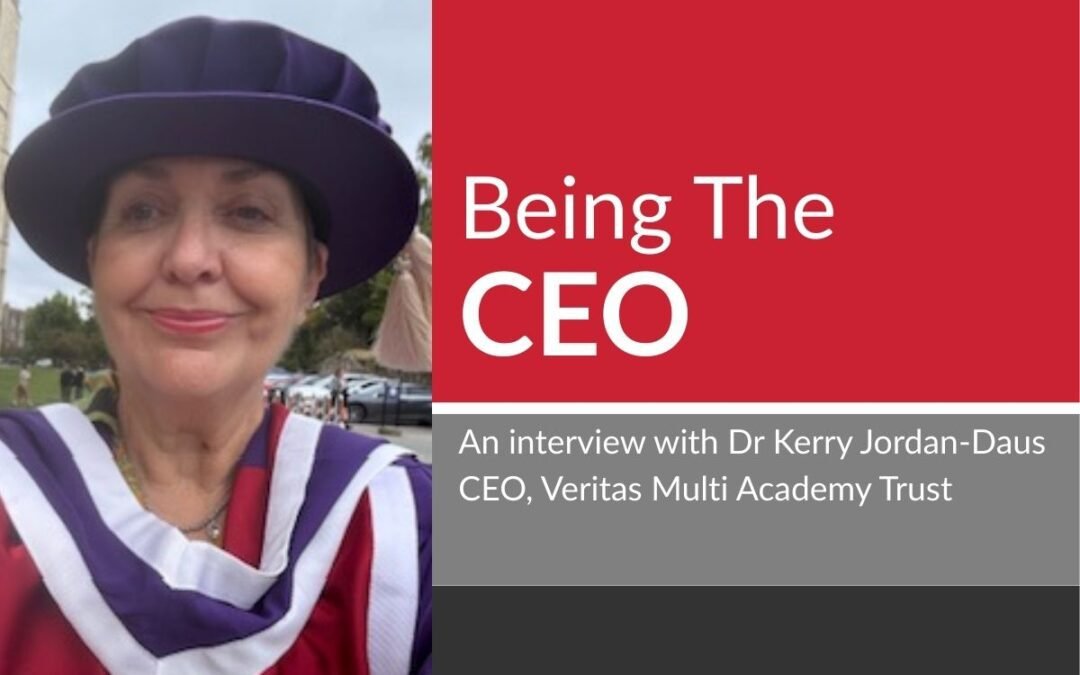‘Academy Trusts at the Heart of their Communities’
“There is an enormous opportunity for the academy trust sector to finally find its place in the world in the coming decade, to find its reason for being, and to lead the way, with trusts defining themselves as community-focused organisations.”
The political sands have certainly shifted in 2019. The turbulence and uncertainty is unlikely to go away completely in the decade ahead; but we can be confident that this new government will undoubtedly cement the role of academy trusts.
Don’t, however, let the politics distract you from other, even more far-reaching developments and dynamics. There is a growing expectation – globally – that all organisations will become more sustainable, more responsible, and much more thoughtful in their definition of ‘success’. This is the real revolution – driven by young people themselves: the new consumers, new employees and, in a digital world, the new thought-leaders. From the CEOs of Apple and Amazon, to the Prime Minister of Iceland, leaders are having to re-think what it means to lead and to reconsider their influence and impact beyond the traditional bottom lines of profit, GDP, or – indeed – other narrow performance measures in education. This will redefine how each one of us leads in the decade ahead. It won’t be simple, but it will be exciting!
Now, focusing on growth and bottom-line results matters. Whether you are in the private sector or trying to lead in a highly accountable and – still – financially weak public sector. But, as CEOs, it’s how we go about achieving that growth and improvement that will matter most in the decade ahead. As I said at our national #TrustLeaders conference in September, this is an enormous opportunity for the academy trust sector to finally find its place in the world in the coming decade, to find its reason for being, and to lead the way, with trusts defining themselves as community-focused organisations.
So, as such, we have developed a new narrative for the academy trust sector.
The narrative is simple: ‘Academy Trusts at the Heart of their Communities’
There are four key elements to this: Community, Sustainability, People and Togetherness.
#Community
“Trusts can be the change they wish to see in their children’s worlds. Looking outwards to their communities far more than they look upwards to ministers and mandarins.”
As the decade draws to a close, we can see how so many of our communities are disconnected and disaffected. Children and young people are in the middle of all this. Trusts can be the change they wish to see in their children’s world. Looking outwards to their communities far more than they look upwards to ministers and mandarins.
Community is a broad term, and we need to think about community in the broadest possible sense. Within our communities are the employers making sense of technological change and artificial intelligence that is coming to dominate young people’s lives. There are the nurseries at the frontline of speech and language development and school readiness. The higher education institutions who can help raise aspiration and inform our curricula. The health and social care organisations and charities focused on securing mental and physical wellbeing in our communities – for parents and children. The community leaders focused on avoiding gang violence and raising aspirations amongst our most deprived and disengaged young people. The professionals – young and old – who want to give back and to help govern organisations with a big stake in their communities.
And, of course, the people who want to serve their communities, and see their role as serving their communities as teachers.
The potential for generating social and professional capital is enormous. In the decade ahead, trusts must rise to the challenge.
I think academy trusts and CEOs in particular can step up here, and are beginning to do so. Far from being seen as remote, over paid, and corporate figures, I think we are seeing the trust CEO role being redefined in exactly the way forward-thinking CEOs envisaged. CEOs as people who are figureheads in their communities, championing children and young people, bringing organisations and people together around the needs and priorities of a locality’s pupils, and shaping their trusts as employers of choice in their communities. That is a far cry from the caricature that some in the media would like to paint of a ‘MAT CEO’.
#Sustainability
It means ensuring our organisations, our people and our children and young people have the resilience and the ability to adapt to a changing world.
There is no doubt that the most important issue for this generation of children and young people is the future of the planet and ensuring that we all act responsibly towards it. The story of Greta Thunberg and the way in which it has inspired a generation of children and young people shouldn’t be ridiculed or lamented by leaders (as we have seen too often this year); it should be embraced and encouraged. Community-leaders know their communities – including communities of young people – are ultimately bigger and far more important than they are. Their voice should be heard. This is about listening and service.
So how are academy trusts using their curriculum freedoms, their links with their communities – including green industries, and elevating the voices of children and young people in order to do this? I am not sure yet.
Sustainability has a wider meaning too. It means ensuring our organisations, our people and our children and young people have the resilience and the ability to adapt to a changing world. Those trusts that are redefining success not just in terms of academic achievement (essential), but also in terms of the skills for the changing world of work, mental and physical wellbeing, and ensuring that we all become masters rather than servants of technology, are leading the way here. ‘Success’ in the decade ahead means so much more than h ow the politicians and civil servants currently define it. It will be fascinating to see which trusts get ahead of the curve.
Again, that requires us to build deep and impactful partnerships with a wide range of stakeholders who are essential in helping us to address these complex, yet profound, issues. It also means that trusts need to be absolutely clear about what THEY mean by their ‘vision for success’, defining and articulating it properly, and being publicly accountable for it – something only a handful of trusts are yet to do.
#People
“the employment model in education – with its rigid structures and narrow (yet high stakes) measures of performance – is going to run out of steam in the decade ahead.”
The world of work will change radically in the decade ahead. A huge number of experienced people will head into retirement, and a new swathe of people will enter the workforce with significantly different expectations of work and the workplace. The new generation have enormous moral purpose. Research tells us they want to make a difference and are willing to compromise on pay – working for organisations that connect with them and their day to day lives. Again, community matters and organisations at the heart of their communities will connect.
However, the new workers also have greater expectations – they want significant flexibility, more work-life balance and less stress, and the chance to lead from an earlier age. Flexibility is the biggest challenge facing trusts and schools. It needs to be on everyone’s agenda. But those trusts that are redefining success and creating a culture that is less about narrow and stifling performance measures, and more about what matters to people and communities, will be in a good position to recruit the best talent. Meanwhile, an organisation that is focused on its community will also need to encourage leadership and recognise wider talents at all levels if it is to deliver on an ambitious and inspiring agenda. Trusts will need to invest a lot of money, time and energy in getting this right – it’s unavoidable.
The fact is that the employment model as it currently stands in education – with its rigid structures and narrow (yet high stakes) measures of performance – is going to run out of steam in the decade ahead. Academy trusts need to be at the forefront of redefining what it means to work in education, with communities, purpose, and adaptability at the heart of their endeavours.
#Togetherness
Finally, the decade ahead needs to see the divisions within the sector healed. Nothing binds communities of people together like service to the next generation. Academy trust CEOs must lead the way, using the scale and influence they undoubtedly have, to galvanise the wider profession and the profession’s partners – from mental health services to large employers – in order to deliver for children and communities. The division between the academy trust sector and maintained sector is distracting and becoming increasingly irrelevant. The best leaders will look beyond it.
It also means CEOs and trust leaders overcoming the sense of competition between trusts (exacerbated by new performance tables of trusts), and the tendency for the sector as a whole to not build bridges with other essential partners. The decade ahead will require outward-facing leadership that generates crosstrust and cross-sector innovation and solutions if we are to meet the challenges and the opportunities it brings. We must be honest about what we can’t do without the help of others.
So, this is how we can redefine the academy trust sector – as one that demonstrates a commitment to community, sustainability, being an employer of choice, and togetherness.
Academy trusts have a choice to make. They can become the caricature that seems to have stuck a little, – distant and removed, obsessively focused on growth, bigger numbers and what the ‘powers that be’ define as successful – often seen to be working in spite of our communities. Or do something more profound, with a spirit of partnership, looking outwards to the passion, knowledge, capacity and aspirations of those around us – within and beyond trusts – to find the best way forward and to achieve sustainable success together.
Michael Pain is the Founder of Forum Strategy, 6 #TrustLeaders networks, and author of Being The CEO
<iframe width=”560″ height=”315″ src=”https://www.youtube.com/embed/ZS9zr7q9jmU” frameborder=”0″ allow=”accelerometer; autoplay; encrypted-media; gyroscope; picture-in-picture” allowfullscreen></iframe>


